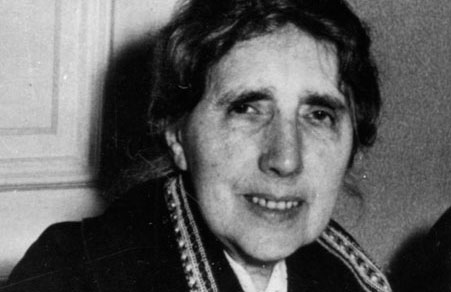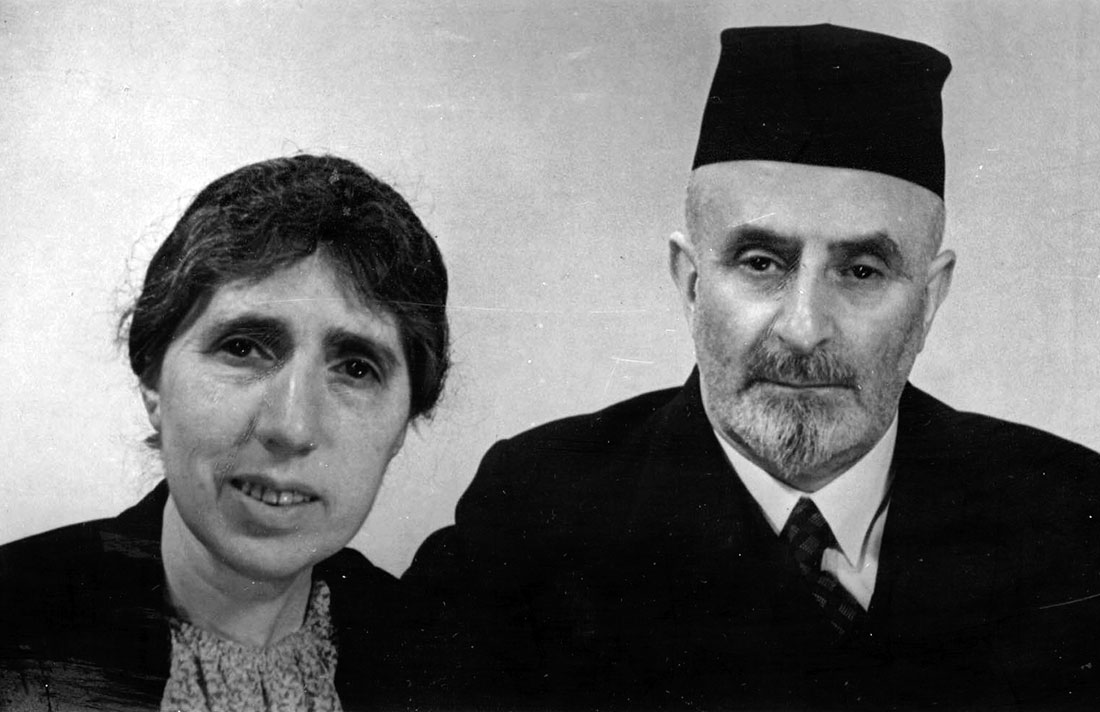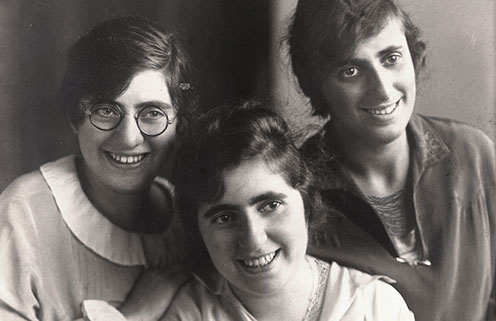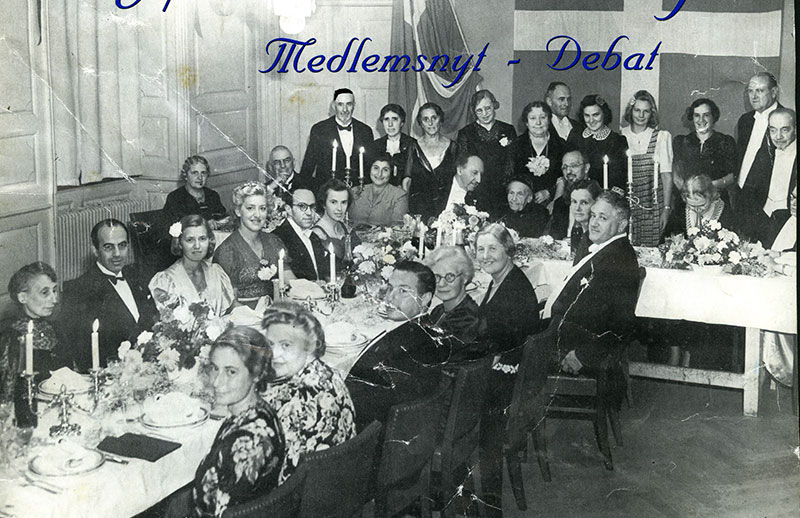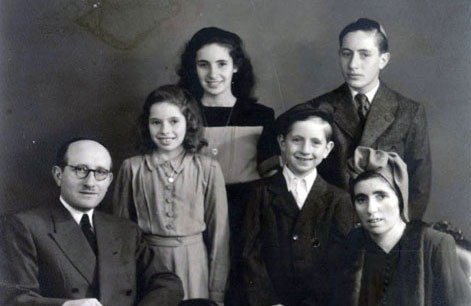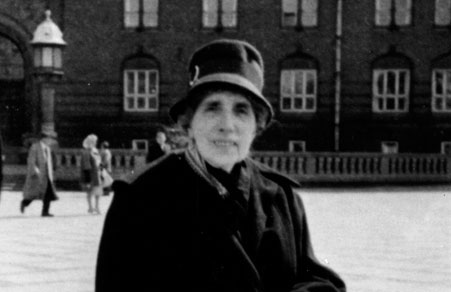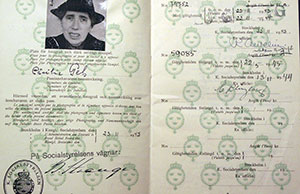Meine Liebe Frau Pels
 More Photos
More Photos
 Click here to read the letters
Click here to read the letters
The “Chessed Connection”
from the Denmark Collection O.27
The Yad Vashem Archives has in its collection a black box. The box is not particularly large or impressive - but it held a secret – as black boxes meant to reveal the mysteries of large disasters usually do.
When this black box was opened at Yad Vashem, out came dozens of letters – folded, crammed together, sent from a variety of places, some postcards, pages written in a cramped fashion, some with envelopes and others without. Some letters were handwritten, others were typed, some were long and others were short - but what they all had in common was the postal address:
Dyrkob 3, Copenhagen, Denmark
and the opening line:
“Meine Liebe Frau Pels, Dear Mrs. Pels”.
Who was the addressee, Mrs. Pels?
Why were there so many letters crowded into this box?
Who wrote these letters, and why were they sent?
There were many questions, but at the outset – no answers. We began our search.
Dyrkob 3, Copenhagen, Denmark
At this address stood a Jewish home for the elderly, the Joseph Fraenkels Old Age Home. Its residents were Jewish refugees from the city of Hamburg, Germany, including a couple named Cecilia and Ludwig Liepmann Pels.
Cecilia, the daughter of Simon Cohen, married Ludwig Pels in Hamburg. The family of wine merchants was very active in Jewish communal life in Hamburg. Ludwig was the head of a Hamburg Chevra Kadisha (burial society) and Cecilia was a housewife who helped in the collection of donations for needy people. The couple had three daughters, Martha, Lisbeth and Irma who each followed a different path.
Martha traveled to Copenhagen to marry Lipman Eliezer Kurzweil, born in Nurnberg and a teacher in Copenhagen. Lisbeth made aliya to Eretz Israel, where she established her home.
Following Kristallnacht in November 1938, the Pels family lost a significant portion of their property. In 1940, when the situation of the Jews had further deteriorated, the Pels decided to escape to Denmark and join their daughter and her family, the Kurzweil family, but only after they had succeeded in sending their third daughter, Irma, to London.
The Pels couple were already in their 60’s when they fled, leaving behind their previous life, identity, sense of belonging, society, native language and their family and friends. They were forced to become refugees in a foreign city.
Cecilia joined the Syklubben Women’s Organization in which most of the women were close to her in age and likewise refugees. The women would make a variety of handicrafts and organize a large annual bazaar. The proceeds of the bazaar were donated to the Va’ad Hayeshivot of Jerusalem, for distribution among yeshivas (talmudic colleges) and yeshiva students.
The collective existence and common experience of the residents of the old age home, together with the letters which arrived from family members and friends left behind in Hamburg, allowed Cecilia and her friends to see beyond their personal difficulties, and to focus on the suffering and distress of others. They decided to take action in their own small corner of existence. Cecilia began to send care packages from Copenhagen to her needy family members in Hamburg.
Cecilia received thank-you letters from her family members in return, in which they asked for help for other people who were also in great distress. It soon became apparent that there was a need to send many care packages to many people. The thank-you letters also included reports of transports, information about the deaths of mutual friends and acquaintances and descriptions of the overall situation – to the extent that they could be written under the restrictions of censorship. Young girls and their educators in an orphanage in Hamburg, from which all but one survivor perished, wrote some of the most unique letters describing their daily life and distress.
Cecilia understood that something needed to be done beyond her own personal capabilities to cope with the ongoing stream of requests. She widened the circle of giving and created a charitable organisation, “Kesher shel chesed”, in which both Jews and non-Jews agreed to be recruited and offer their name in order to send the packages. The project became a collective project of the female residents of the old age home at “Dyrkob 3”.
The cost of sending these many packages was above and beyond the capabilities of the refugee families in Copenhagen, so it was decided that the monies raised at the annual charity handicrafts bazaar would go toward the sending of the packages to Europe, rather than a donation to the yeshivas in Jerusalem. In addition to the financial burden of sending so many packages to Germany, the charity project was in effect a violation of German law, which forbade the sending of packages to anybody who was not an immediate relative. Due to food shortages, a similar prohibition was legislated by the Danish authorities.
The heads of the Jewish community, who were reluctant to provoke the wrath of the authorities and feared the outcomes of the women’s activities, expressed their opposition. However, the women managed to find ways to circumvent the prohibitions and continued to send the food packages to seven occupied countries.
One of the people who joined their effort was the Pels’ daughter Martha who, in the natural order of things, knew many more people in Copenhagen and also spoke the local language. Martha took upon herself additional organization, errand running, enlisting the efforts of other people – as well as sending the actual packages.
In order not to arouse further suspicion, the women did their best to send the packages from different post office branches throughout the city. For this task they also enlisted their grandchildren, who would travel throughout the city on their bicycles in order to help send the packages.
During the weeks and months that followed, more and more of the intended recipients of the packages were sent to their fates in various death camps.
In October 1943, the Pels couple and their family escaped to Sweden - along with most of the Jewish community of Copenhagen.
At the end of the war, the Pels family returned to Copenhagen.
Cecilia Pels died in 1965, at the golden age of 83 years.
Letters from Ketty Goldschmidt to Cecilia and Ludwig Pels
20.3.42
Hamburg 13
Grindelallee 178/1
Dear Mrs. and Mr. Pels,
Since I have heard so often of how wonderfully you remember and delight your friends with loving gifts, I allow myself to ask you if you could send us some meat products for the festivals. At the same time I would also like to send you greetings from Mrs. Jenny Hesse who lives with us. Last week she was released after seven weeks in the hospital and still needs a lot of care. Also Mr. and Mrs. Edward Cohn of Altona, Hochstrasse 50, send their best regards. They haven’t received anything from you up till now and would be very happy if they could receive something for the festivals. My husband David Samson G. has previously signed letters to you but he has never brought himself to ask you personally for something. Therefore I have taken it upon myself and I hope you don’t mind. Also I wish you pleasant holidays and greet you with best thanks in advance, also from my dear husband,
Yours
Ketty Goldschmidt
30.3.42
Hamburg 13
Moorweidenstrasse 14
P.S.Best greetings and many thanks, yours David S.Goldschmidt
Dear Mrs. and Mr. Pels,
Many many thanks for your very swift answer, dear Mr.Pels. The package for Mr. Kahn arrived already today. I shared it with Cohns and Mrs. Hesse. It brought us great joy and excitement. Please accept our heartiest thanks for contributing to the happiness of our holidays. Our move to Altona should have been today but has unfortunately been postponed to tomorrow. Because of the short time of preparation your package was especially useful. I want to wish you once more nice holidays and good wishes,
Yours respectfully,
K.Goldschmidt
A postcard from L.Szlamowicz, Andrzejow forced labor camp, near Lodz
Over the period of Cecilia’s activity, the Jews receiving the packages were deported from their homes. The women started to send these packages in their footsteps to Theresienstadt, Westerbork, Andrzejow forced labor camp, near Lodz and the Warsaw Ghetto. Packages were also sent to Amsterdam and various locations in France, and the common destination of each package was a family in dire need.
Ohlendorf d. 21/3/43
To the Jewish community of Copenhagen
I ask to please locate and hand over this package to the Frenkiel Home, whose address I am unaware of. Dear cousin let me notify you that I am at work 18 months already and haven’t had any message from my family... may I ask you to help me I am without clothing underwear coat a pair of shoes a 29 and if it is possible may I ask you some food provisions I believe you will fulfill my wish for which I thank you in advance I am the son of Aron Szlamowiez I send my hearty regards your cousin...
Absender: L. Szlamowiez
Ohlendorf- Andrzejów
Kreis Litzmannstadt
Postcards from Rosa and Ascher Mayer
Through the postcards and letters we can trace back the fate of some of the Jews who received the packages.
Rosa and Ascher Mayer sent a thank-you letter from Berlin September 1942.
Berlin, 10.9.1942
First of all I owe you my very hearty thanks for the loving package you have sent us again and with which you have given us great joy for the holiday (“Yonteffreude” - Rosh Hashana). Unfortunately we have heard nothing at all from our dear aunt Augusta, and just as little from my oldest sister, who is also in TH (Theresienstadt).
We are here now completely alone. From our dear children we have good news, thank G”d.
I would like to take this opportunity to express my deep gratitude for... and for the love you have bestowed on us in the last years.
We will be leading our prayers on this holy day at home. May the All-gracious inscribe you and your loved ones for good. Warmest greetings and sincerest wishes,
In admiration, yours
Ascher Mayer
It is difficult to live our dire and modest existence since the departure of our loved ones. My dear husband went today, right after having received your kind card, to the respective gentleman. He was dumbfounded concerning the names on the package since his sister neglected to tell him, that we would be receiving half of the parcel. Only today did he receive the news concerning us.
But my husband could nevertheless receive a nice sausage and a glass of jam. It is only for reasons of propriety that I feel obliged to tell you this. We will enjoy the sausage greatly and along the way will think of you in love and gratitude.
We send you and your dear daughter warmest greetings and wishes, may you be inscribed and sealed in the Book of Life.
Hoping to hear from you soon,
Rosa
In August 1943 they sent a postcard from Theresienstadt, to which they had been deported.
According to Yad Vashem records, by 1944, both of them had perished there
Th. 1.8.1943
My dears,
We have arrived in good health, hopefully you are also feeling well. Please write us often, even though we write rarely. Small packages, letters and parcels reach us punctually and we are very happy about them. We think of you a lot and greet you heartily,
your Ascher Mayer
and Rosa Mayer
The Paulinenstift Orphanage for Israelite Girls
Among the many thank-you letters were several from the Paulinenstift Orphanage in Hamburg. The letters express the staff’s and especially the girls’ happiness in receiving the packages, which enabled them to celebrate and enjoy Rosh Hashana and Hanukkah and receive extra food portions as their meals were becoming smaller and smaller. The staff members and the girls individually signed these letters. The translation of this letter is faithful to the children's use of language in the original.
Hamburg, 24 September 1941
Dear Mrs.Pels,
Thank you so much for the beautiful parcel – we ate it on Rosh Hashana eve and it tasted delicious; that was really a tasty parcel. We also heard the blowing of the
Shofar and we wore our most beautiful clothing. Many new children have joined us and we want to tell you what their names are: Wolfgang Emanuel, I’m 5 years old, Marion Emanuel, I’m 5 years old, Rosi Lanzer – I am also 5 years old, Irmgard Valk, 5 years old, Konrad Garcia, am 4 years old: Me you must still know - once you gave all of us a windmill; Elchanan Jarezki, I’m 4 years old, Simmy Beutel, am 4 years old, Heinerle Leviesohn, am 4 years old, Hella Buenger – am 3 years old, Zita Feldmann, am 2 ¾ years old and Dani Kroner, I’m 2 years old - the youngest of all. These are all the children. In the summer we went on beautiful excursions; we were in Blankenese at the beach und went swimming. Once we went cranberry picking in the forest. We also picked heather flowers. Once the big children made an excursion, so we drove to Hausbruch to pick berries. Aunt Alice was on vacation so we went to visit her. We also saw chickens. 3 kids left for school after the summer vacation so we undertook a farewell excursion to Neugraben. We bravely climbed up the mountains. On another occasion we went on a really very big excursion in which the youngest children (“Hasen”), schoolkids and caretakers (“Tanten”) joined in and we hiked all day long.
Many regards from all the children.
Dear Mrs.Pels,
We wanted to thank you as a start and that is why we sent the card in advance; there wasn’t enough time to have the children write before the holidays but now they can tell you themselves how delicious it was.
There is something I must tell you, namely that we aren’t merged with the boys’ orphanage; surely you heard about such plans, at the time there was talk about it, but luckily it didn’t work out. I assume you were informed since the card was sent to the Papendamm.
I wish you an easy fast and warmest regards,
Your Alice Gramm
Hamburg, 28 September 1941
Dear Mrs.Pels,
In the name of the whole Paulinen Foundation we would like to thank you warmly for your generous gifts. You can’t imagine the pleasure you gave us with them. It was all very delicious and a real feast for us… So many people have promised already to send us something, but none of them have kept their promise. That’s why we are particularly grateful to you! Hopefully you are enjoying the holidays. In the hope that you and your relatives are well, we remain in deepest gratitude,
Yours,
Regina Wolfson
Inge Weiss
Claere Meier
Hilde Futter
Inge Polak
Hanni Bernstein
Inge Salomon
Vera Cohn
Karla Ganser
Ruth Geistlich
Helga Bielefeld
Esther Ascher
Inge Rosenthal
Regina Rothschild
Gerda Rosenthal
Sigrid Dettmann
Margot Prenski
Ines Spitz
Miryam Rothschild
Henni SamsonSenta Valk
Rosa Beutel
Friedel Cohn
Mela Koenig
Dear Mrs.Pels,
Also we - the caretakers of the Paulinenstift,
enjoyed the gifts you sent greatly and would
like to thank you warmly for them.
Hildegard Cohen
Alice Gramm
Gerda Oppenheimer
Margot Hofmann
Edith Kugelmann
Hamburg, 21 December 1941
Dear Ms. Pels and dear Ms. Kunstadt,
With gratefulness we have received your last package. Friday evening we provided an excellent soup with it and furthermore sausage with a mash of potatoes. Soon we will have green cabbage with meat, for which we all are eagerly looking forward. Every time when we're eating these fine things we are thinking of you, you who are the dear donator of these delicacies. At Hanukkah we received the bonbons we desired and received everything as far as possible. Also a magician came. Every time we tried to prove him that everything was a fake, but we didn't succeed. After the event he was very weary. When we wanted to have a look at his equipment he disallowed it. Since we are in Papendamm we always play table tennis but we would prefer being in the running trench. In school we are now only very few children and four classes were combined, therefore we don't learn as much anymore. Did you, dear Ms. Pels and Ms. Kunstadt, also enjoy Hanukkah? Do you also know the children of the teacher Mr. Katzenstein? They too live in Copenhagen.
Mr. Katzenstein is still at our place. Unfortunately today is the last Hanukkah evening, all evening during the Hanukkah week we played Gods Blessing at Cohen and hammer and bell. Madam Cohen gave us money to play. Many people of the congregation visited us - including director Jonas. Do you know already that Manfred Norden got engaged? To sister Margarethe? We also made madam Cohen a favor as the group of little schoolchildren gave her a carnation (Nelke) and the big ones a "Fleissiges Liesschen" as a present.
Dear Ms. Pels and Ms. Kunstadt, hitherto the children dictated the letter, now I want to declare my gratitude first of all, I can't even express it, how affecting I find it from all of you, to care so much for us. Due to this the Hanukkah feast was extraordinarily neat, and at the dinner we even celebrated you, so that your ears must have clinkered on the evening when we consumed our feast dinner. If you knew how poor in enjoyments our life nowadays is, then you could profoundly well understand how your packages brought joy to us. The children are not even able to express their joy and gratefulness by letter; you would need to see their radiant children-eyes when delivering the presents to them. And again and yet again I have to emphasize that also we adults pasture ourselves in such a rare pleasure, our overall thanks you should know in all conscience.
Many warm greetings and again deep thanks.
Hildegard Cohen










